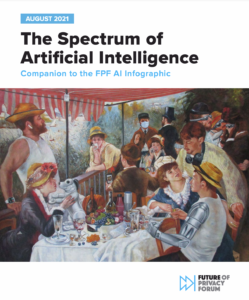CDT's "Always On" – the Digital Student
FPF attended the “Always On – Digital Student” forum hosted by the Center for Democracy & Technology and the Data Quality Campaign on September 24, 2014.

Nuala O’Connor, President and CEO of CDT; Aimee Guidera, founder and Executive Director, DQC; and Brenda Leong, FPF Education Policy Fellow.
The Digital Student Challenge
Jon Phillips of Dell opened the session with a challenge that we need to change the learning process as well as change how we measure the learning that is occurring. He emphasized the need for students to be more active players in their journey, with ownership of the goals and the process to achieve them. This is a growing refrain in privacy circles, recently addressed by FPF’s parent blogger, Olga Garcia-Kaplan.
Phillips emphasized the 4 aspects of good digital design:
– helping the teacher and student orchestrate the learning environment
– creating a collaborative environment for meaningful learning to occur
– maintaining focus on the critical value of experiential learning
– applying assistive or adaptive tools to make the tech a tool that enable learning for all students
Phillips’ key is that true personalization should be the central tenet, while allowing students a personal voice and self-direction to ensure they understand the relevance of the learning process for their own goals. He sees personalization as: digital literacy; data security; and integration. He also pointed out that in such a model, even with an increasing role for technology, the teacher’s impact is dramatically important for success. Because teachers can be overwhelmed with technology opportunities, we should offer help to deliver the relevant and effective tools they can use.
Phillips concluded with the challenge to create the freedom for teachers to take risks, and for those risks to be rewarded, and to find ways to bring students into the technology conversation and process.
Principles and Ethics
Following Phillips’ presentation, small groups of attendees addressed a variety of questions facing the edtech community, which were then pulled into a larger discussion with a panel of privacy experts. These addressed many of the key issues that FPF is currently working on and publicizing. First, participants agreed that there are many “basics” that most schools, companies, and parents agree on for privacy and data security protections…many of the things that schools have always done (grade work, take attendance, discipline students) but is now digitized and thus maintained, evaluated, and aggregated in ways not historically possible.
Most attendees agreed that after some of this “low hanging fruit” is addressed, the tougher issues of ethics in the new uses of data previously inconceivable must be addressed. The role of parents, the possibilities of certification processes for specific education apps, within the need to clarify what a student’s expectation of privacy really is, or should be, were all explored.
The panel also agreed that part of the way forward is to clarify the conversation, separating out not only “privacy” from “security” as individual requirements and challenges, but also to disentangle privacy-specific concerns from the broader curriculum and educational reform movements. FPF recently published. on the ethics of student privacy, and the trust required between parents and schools.
Importantly, as pointed out by panelist Shannon Sevier, President of the National PTA, parents must be included in the conversation. Since most parents will not be technology experts, much less privacy savvy, communication must include the what/why/how of data collection and use by schools, as well as clear descriptions of the benefits, rather than the rarer (but media-attractive) scare stories. A blended approach to classroom and homework is an important part of changing the way learning occurs, but safeguards are needed to ensure equity of access to the various technology portals, something not yet available for all students.
All agreed that today, use of technology is growing and changing faster than best practices and communication have adapted, so it is incumbent on companies and privacy advocates to help families and policymakers catch up, with outreach and programming that helps make clear what the existing rules are, and guides the conversation toward future enforceable standards.
At the end of the day, many voices agreed that citizenship, while moving into a digital age, is still a question of values and judgment and learned behaviors. Students must be taught their “digital citizenship” with its associated rights and responsibilities, just as they have been in more traditional forms in the past. FPF continues its work with a group of education and industry stakeholders. If you are interested in participating, contact us at [email protected].



